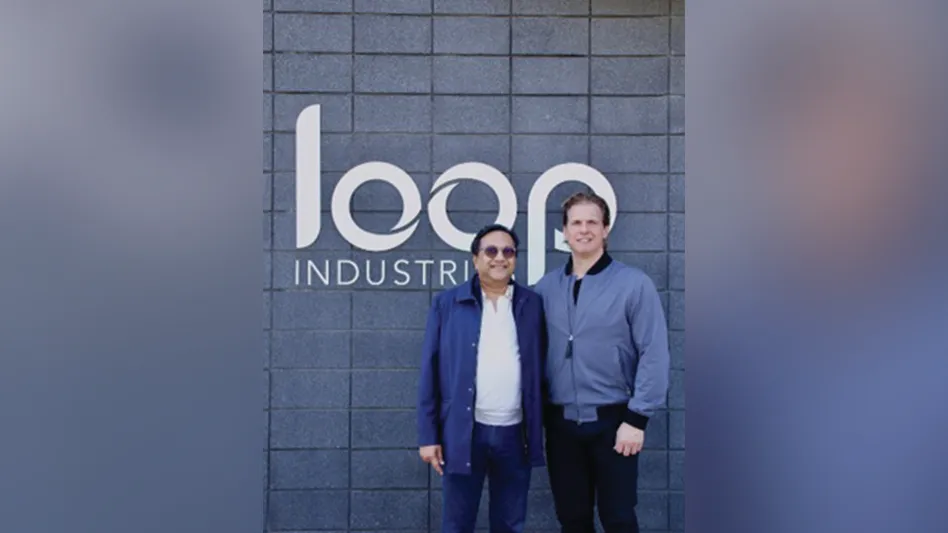
Photo courtesy of Loop Industries Inc.
Loop Industries Inc., a Montreal-based recycler of polyethylene terephthalate (PET) and polyester fiber, has announced an agreement with India-based polyester film and specialty polymer producer Ester Industries Ltd. to form a 50/50 joint venture.
The purpose of the joint venture is to build and operate an “infinite loop” manufacturing facility in India that will produce a unique product offering of lower-carbon-footprint recycled dimethyl terephthalate (rDMT), recycled monoethylene glycol (rMEG) and specialty polymers in India, using the Infinite Loop technology which Loop Industries says offers significant advantages over traditional mechanical PET recycling.
RELATED: Loop, SK Geocentric to deploy Loop’s technology in Asian market
Loop and Ester already have an established working relationship, with Ester producing Loop PET for Loop Industries’ global brand customers over the last four years. The companies say their joint venture leverages Loop’s technology and global customer base with Ester’s nearly 40 years of specialized polymer production, operational proficiency and local expertise, including the sourcing of PET and polyester fiber scrap feedstocks.
According to the companies, the DMT and MEG specialty chemicals global market size is estimated at $28 billion and is forecast to grow at a 3.7 percent compound annual growth rate (CAGR) through 2033. They claim the market is experiencing a global shortage of DMT due to recent plant closures in Europe, and low-carbon DMT and MEG are in high demand, but market options are limited and costly. They add that the Infinite Loop India facility is expected to produce 70,000 tons of rDMT and 23,000 tons of rMEG annually, and Ester will toll convert the rDMT and rMEG into various grades of specialty polymers.
“Our partnership with Ester reflects a strategic alignment built on our shared values of sustainability and innovation and combines both companies’ areas of expertise,” Loop founder and CEO Daniel Solomita says. “The specialty chemicals market offers a unique opportunity to expand the reach of our Infinite Loop technology beyond PET and polyester fiber and provides our customers with a sustainability-linked advantage in the specialty chemicals market. Customer demand for rDMT, rMEG and specialty polymers produced using our technology is robust due to very limited viable options available in the marketplace today.”
The planned facility in India can lower carbon emissions by up to 70 percent compared to virgin DMT and MEG manufacturing from fossil fuels, the partners say, offering chemical companies a drop-in supplement and circular alternative that can help them achieve sustainability goals.
In a news release, the companies say the rDMT and rMEG product offerings manufactured at the Infinite Loop India facility “represent a strategic product expansion in a low-cost manufacturing environment which complements Loop’s existing PET plastic and polyester fiber manufacturing business and will fuel growth by addressing the large and growing demand in the market.” They expect the expansion will enable the Infinite Loop technology to reach new markets and cater to a broader range of customers across industries including electronics, automotive, textile, cosmetics and packaging.
The India facility will leverage the Infinite Loop technology and existing engineering package which accelerates the lead time towards groundbreaking, slated to occur by the end of this year. Feedstock sourcing for the facility—in which there is abundant supply from textile scrap in India, according to the companies—is underway and the companies have engaged an external firm to source and secure land for the facility. Construction is expected to be completed by the end of 2026, with commercial operations beginning in early 2027.
The companies say the India joint venture offers attractive economic returns without the need for substantial sustainability-linked premium pricing. The total capital investment is estimated to be approximately $165 million.
“Ester and Loop have a long-standing working relationship with a deep alignment of values and shared commitment to circularity and driving sustainable change,” says Ester Chairman and CEO Arvind Singhania. “This partnership reinforces our dedication to advancing sustainable solutions in the polymer industry and by leveraging Loop’s technology alongside our decades of polymer production experience, we will contribute to reducing the carbon footprint of our products, meeting the evolving needs of our customers.”
More from our latest newsletter
- Domestic ferrous scrap market remains on ‘sideways’ trajectory
- Furthur volatility looms in nonferrous markets
- Hydro announces leadership changes
- Essential elements
- Novelis files registration statement for proposed IPO
- Latest Global Plastics Treaty talks yield progress, frustration
- Smurfit Kappa sees volume growth in Americas, Europe
- Loop Industries, Ester Industries form plastic recycling joint venture
- Report: Suzano preparing $15B bid for International Paper
- BlueAlp to provide chemical recycling technology to Italy’s RES





